A majority of new managers are minimally or not-at-all satisfied with the amount of managerial training they've received, according to a Capterra survey.

Managers play a critical role in the success of your employees and ultimately of your business itself. A high-quality manager can improve worker productivity by as much as 50%, while a low-quality manager can be the last straw that convinces your best and brightest to look for a job somewhere else.
Managers matter that much.
Despite this, our recent survey of nearly 250 U.S. managers revealed that many businesses are leaving a lot to be desired when it comes to managerial training and development. Managers want more training, and some want it so badly they're ready to accept a job offer that promises it if one comes along.
Here, we'll present the findings from our survey, revealing how little training managers are receiving, how managers feel about this, and in what areas they want to receive more training and support from their employer.
We'll finish with tips on how the right software can help you develop better managers.
How little training are managers actually getting?
Some 40% of managers have received two hours or less of managerial training in the past year. For new managers, the numbers are even worse.
According to the 2018 Training Industry Report, the average company administered almost 47 hours of training per employee last year—around a full workweek's worth.
Yet, only a small fraction of this was dedicated to helping our respondents become better managers: 40% of managers received two hours or less of managerial training in the past year, and 65% received five hours or less.
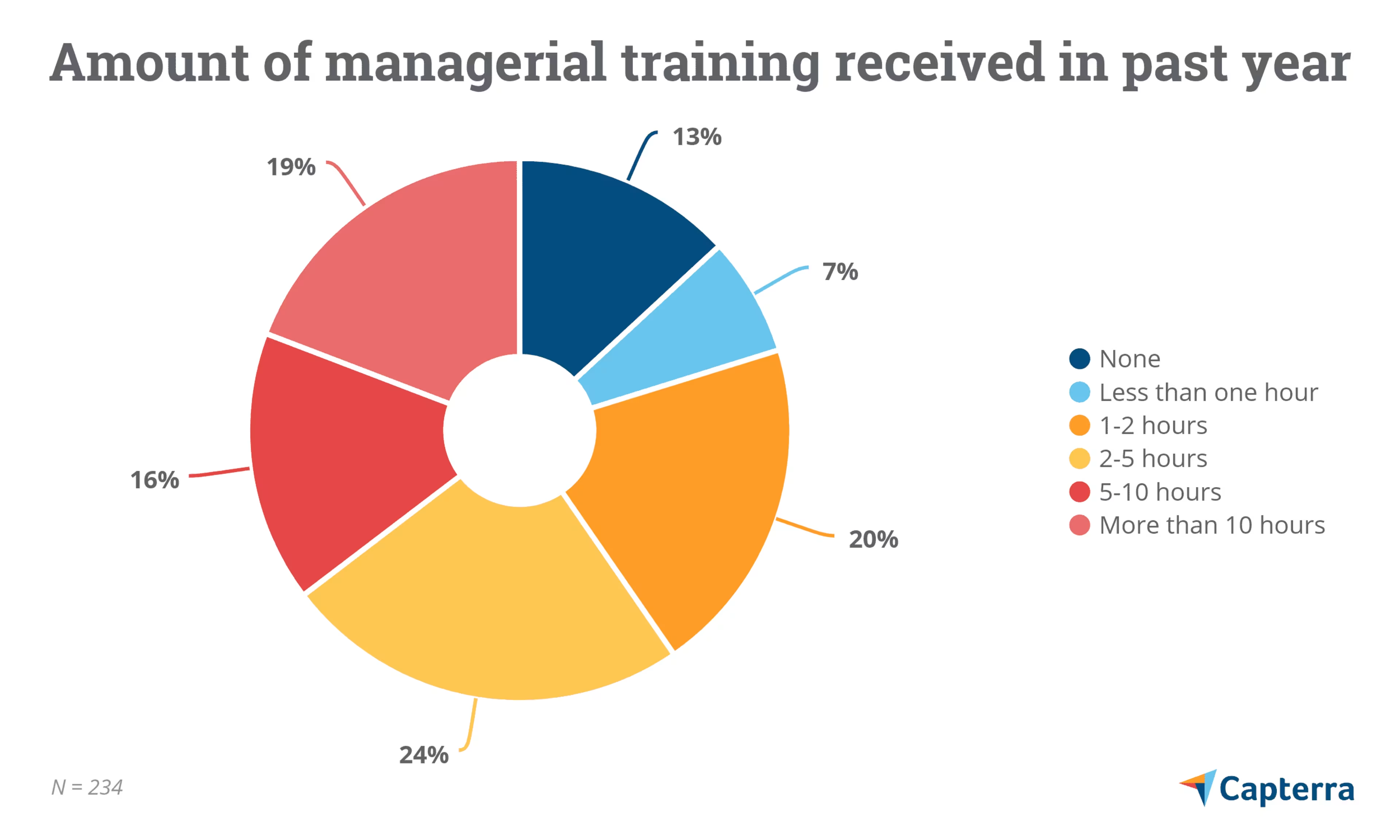
A handful of factors are to blame. A lack of training resources and focus on managerial development at an organizational level, for one. Managers also report spending too much time on administrative tasks and feeling too overwhelmed at work, which can hinder formalized training efforts.
That being said, many managers still expect more from their organization, as nearly one in three (31%) are minimally or not-at-all satisfied with the amount of managerial training received from their employer.
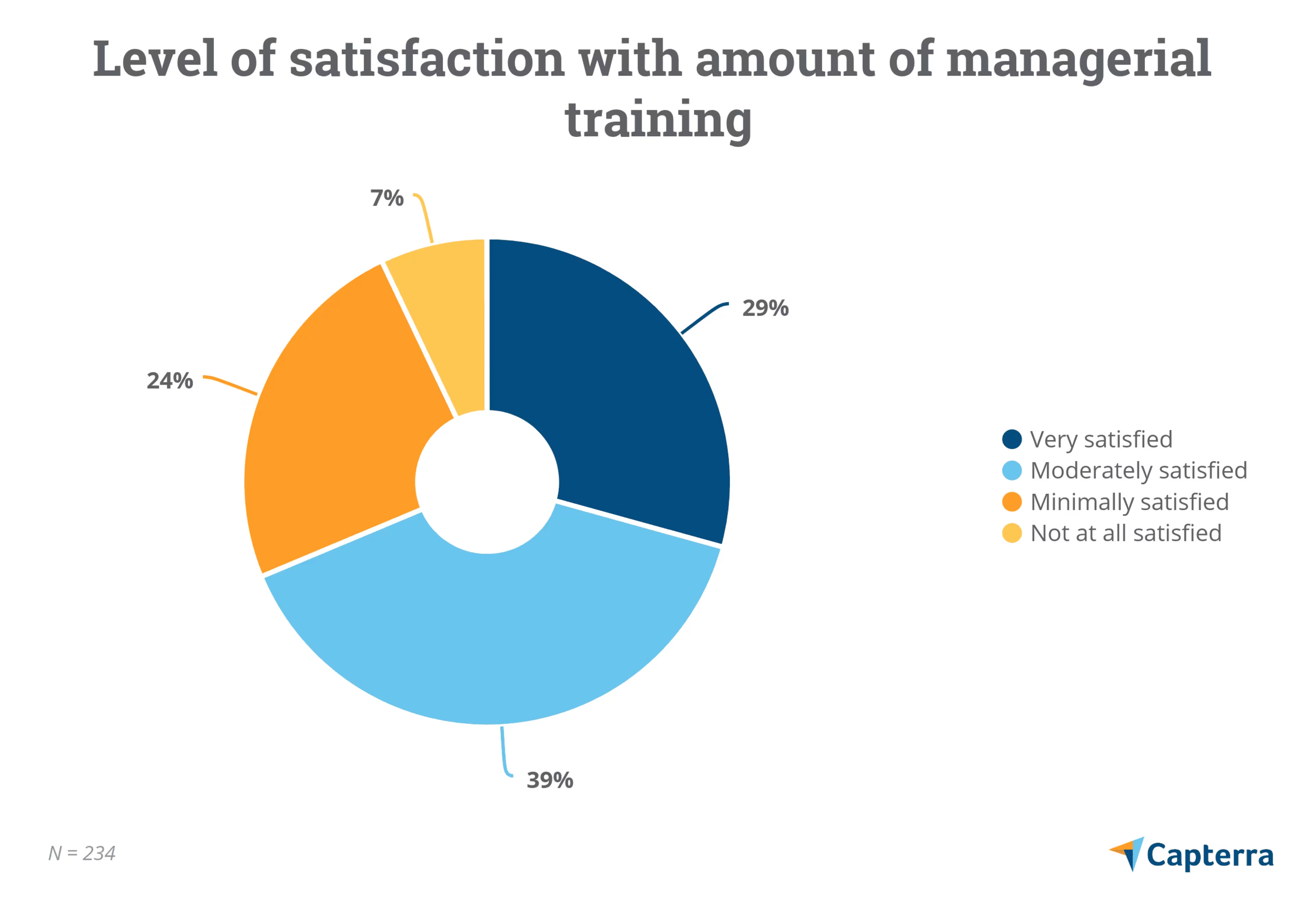
For new managers—defined as having less than a year of managerial experience in their careers—the situation is even more dire, despite that they are arguably the group in most need of support. A majority of new managers say they receive little training and aren't happy about it.
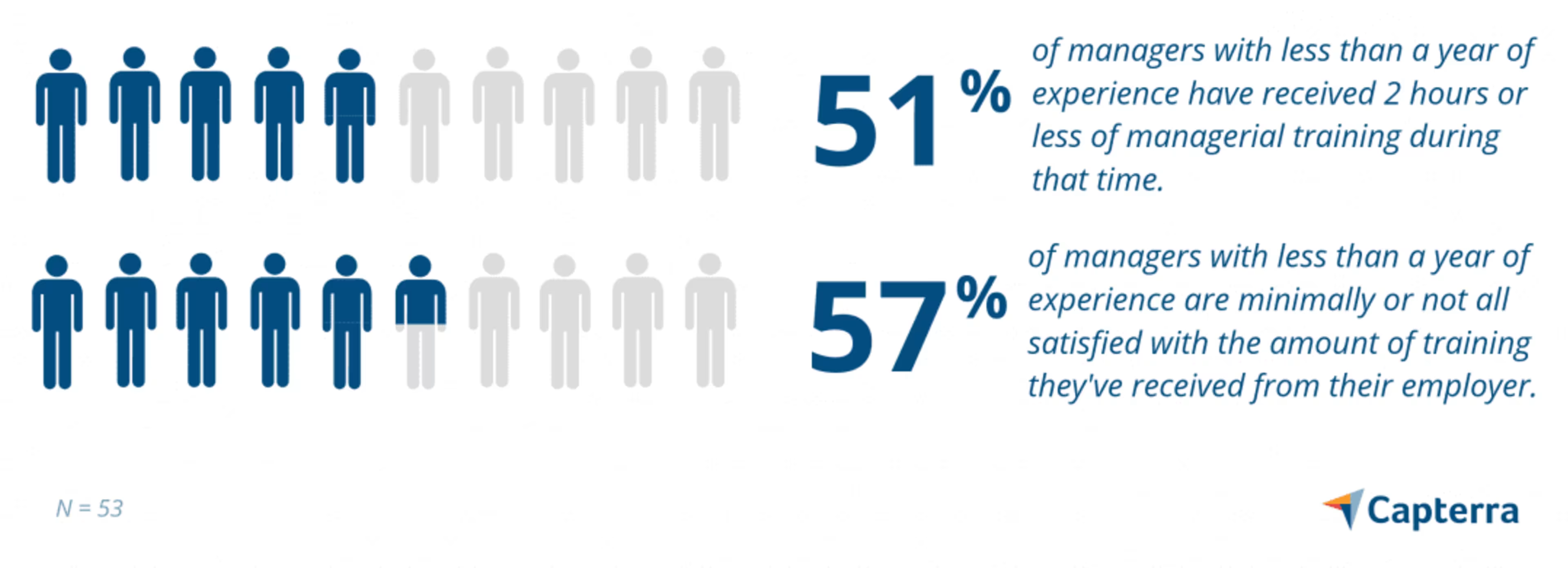
The bottom line for businesses:
As the saying goes: You get what you give. Organizations that continue to leave their managers high and dry when it comes to their training and development will suffer the workforce consequences of poor management: low productivity, engagement, and retention.
When you add in the facts that managerial talent is hard to come by in these times of record-low unemployment and that companies often choose the wrong candidate for managerial positions anyway, you're looking at a recipe for disaster if you fail to invest in proper managerial learning and development (L&D) today.
Most managers would consider a job offer that guaranteed them more managerial training
Poor managers will cause turnover issues on their own, but our survey found that poor management development could also cause promising managers to take their talents elsewhere.
When asked how likely they would be to consider a job offer from a different employer guaranteeing them more managerial training, all else being equal, 58% of managers say they are very or moderately likely to consider such offers.
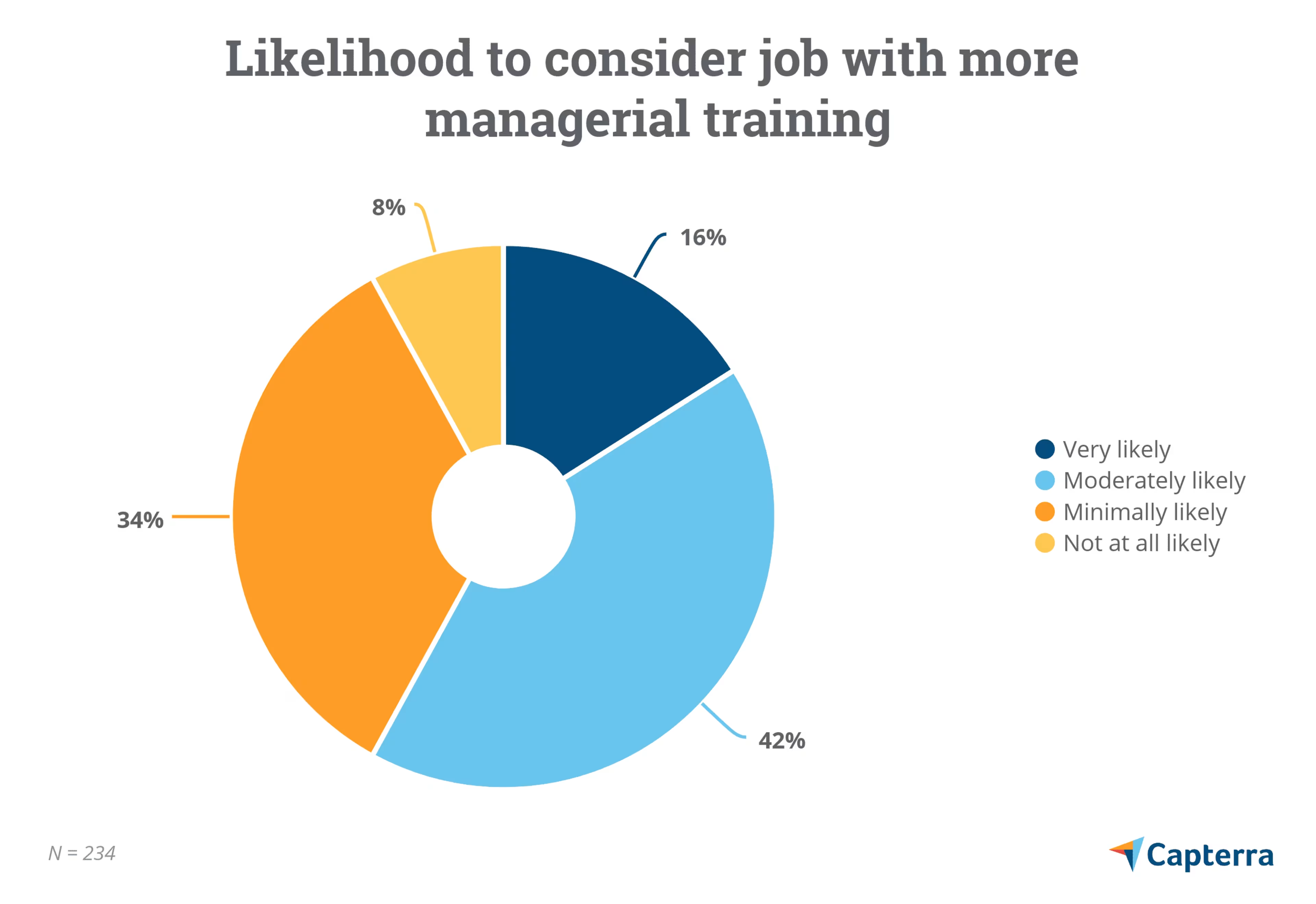
This desire for more L&D is a growing priority among job seekers. According to LinkedIn, growth opportunities are the second most important factor in job searches behind compensation. A separate study found that 68% of workers have changed jobs in the past because of a lack of L&D opportunities.
The bottom line for businesses:
Managerial training is as much a retention issue as it is a competency issue in this hiring market. If you don't offer the L&D opportunities that managers are looking for, they'll simply find a job at a competitor that will.
Proper succession planning in tandem with frequent development discussions communicates to managers that you're listening and trying to support their needs, which can help ensure that they don't leave your organization prematurely.
Interviewing and hiring, conflict resolution, and mentoring are top desired areas for more managerial training
Our survey results show that businesses need to put more resources behind managerial development. But where should they focus those resources? Where do managers stand to gain the most ground?
To find out, we asked respondents who are minimally or not at all satisfied with their amount of managerial training the three areas they'd most like to receive more training in. Interviewing and hiring (31%), conflict resolution (27%), coaching/mentoring (26%), and team-building (26%) came out on top.
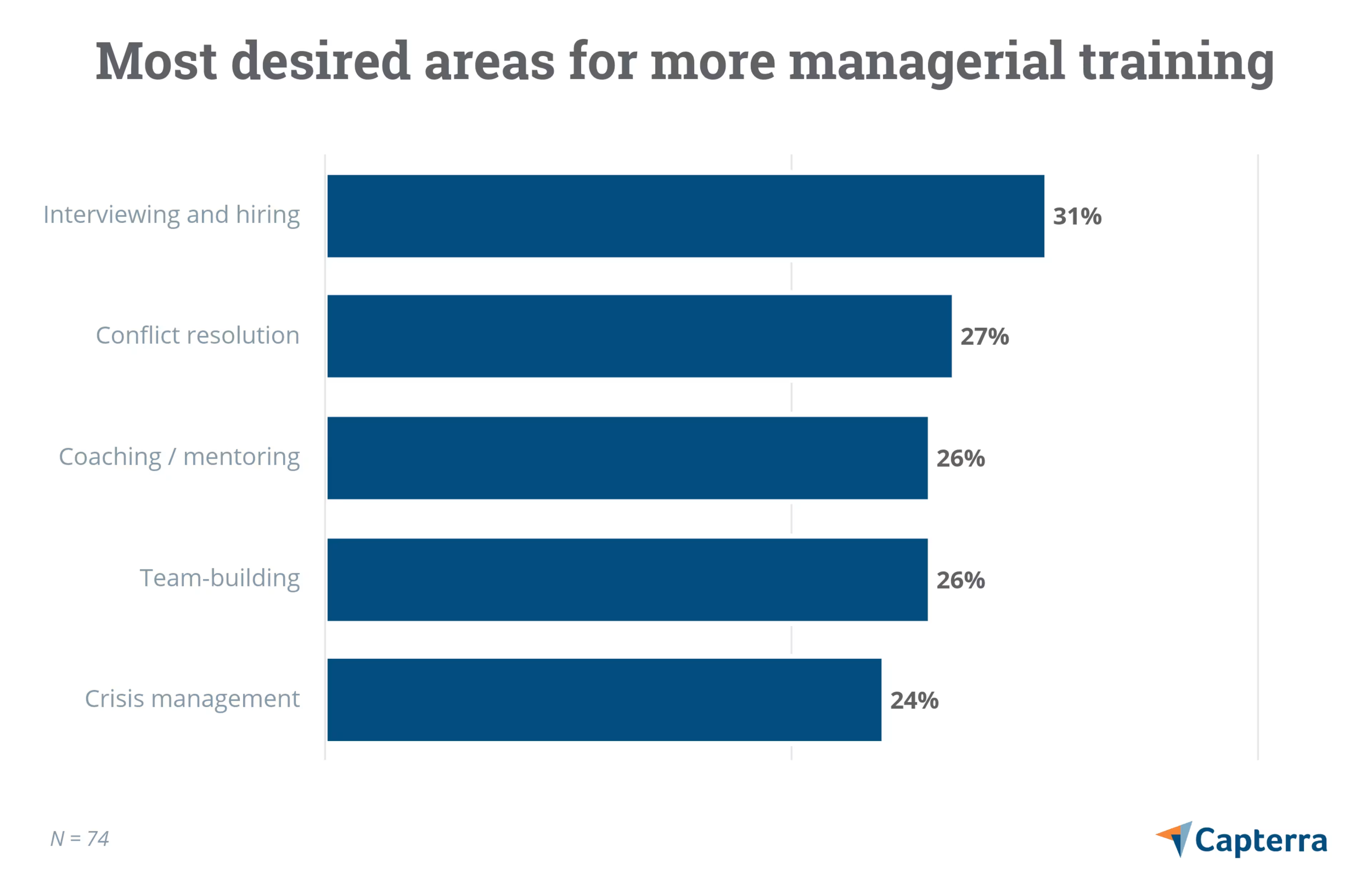
Despite the stress that organizations put on bringing in the right people and the five-figure cost a business absorbs with every bad hire, hiring managers often still struggle with this aspect of the job. One in five have accidentally asked candidates an illegal interview question, and recruiters admit that the biggest bottleneck in their job is working with hiring managers.
Not only should recruiters work with hiring managers to get on the same page in terms of what a great job candidate looks like for your organization, but they should also coach hiring managers on how to properly conduct interviews and assess candidates.
People in management roles spend a lot of time on conflict management. CFOs, for example, spend six hours a week managing staff conflicts. To set managers up for success in these situations, HR needs to offer managers empathy training to strengthen an important conflict resolution skill that's sadly diminishing over time. Guidance on important conflict resolution policies is also encouraged.
Lastly, what about mentoring? While historically, mentoring has been seen as an ad-hoc process driven by an employee's desire to learn and grow, more and more businesses are seeing success with formalized mentoring programs that proactively pair workers together. Seventy-one percent of Fortune 500 companies offer mentoring programs to their workers.
Our survey results indicate that the manager's manager plays an important role too. Of those who are very satisfied with the managerial training support they've received, 96% say their current manager has been moderately or extremely helpful in mentoring them. For those that aren't at all satisfied? Only 24% have a current manager who has helped mentor them.
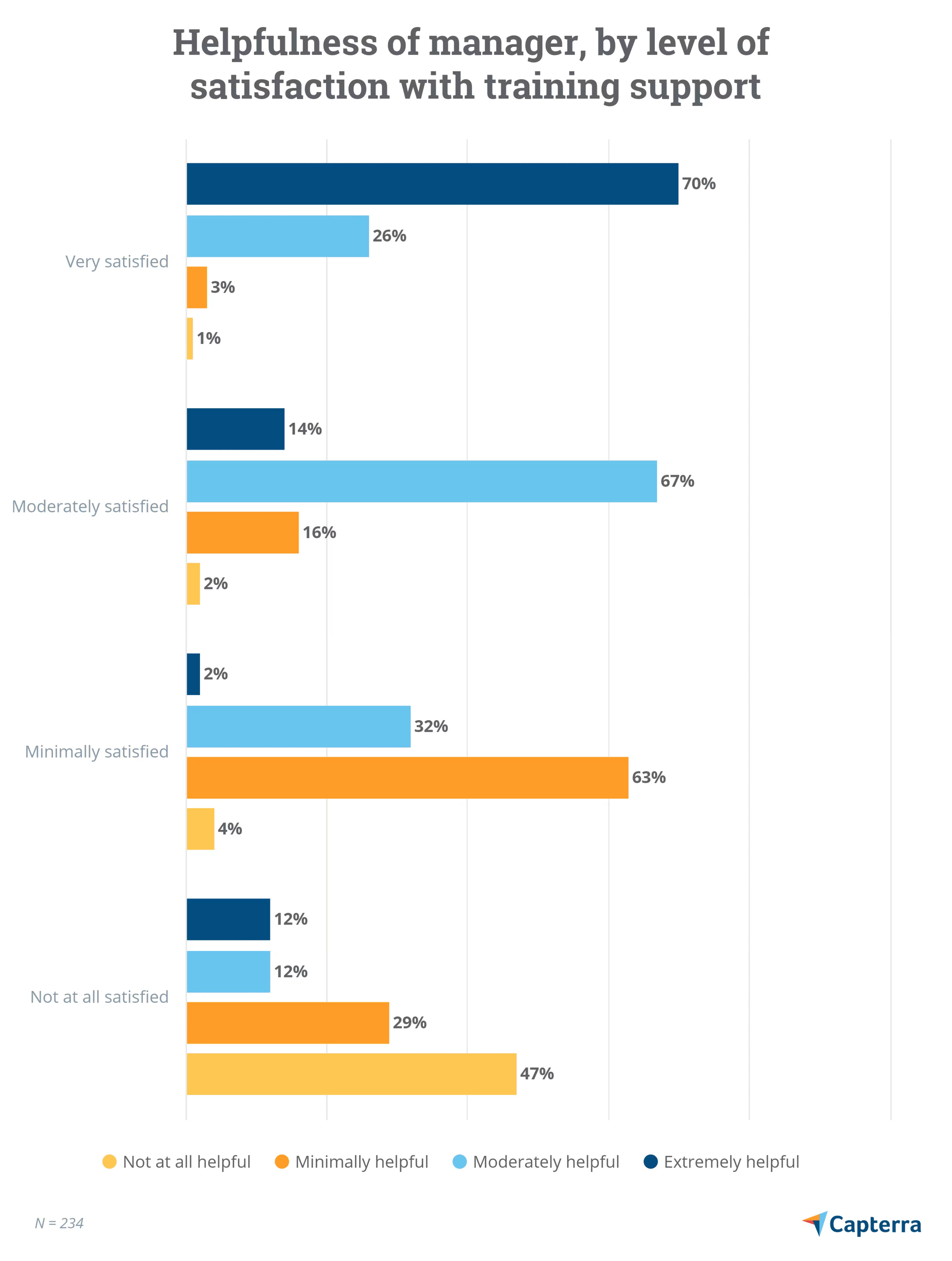
The bottom line for businesses:
A good manager is like a Swiss Army knife for your business: equipped with the right tool for the job in a variety of scenarios. It can be daunting (and costly) to tackle all of these necessary managerial skills at once, which is why you need to prioritize.
But maybe your managers are an exception to our results. If so, find out. Use surveys and employee feedback tools to understand where your managers are struggling the most, so you can pinpoint which training resources and support to offer first.
How software can help give managers the training they need
Whether managers are hired externally or promoted from within, businesses can't afford to simply throw them in the deep end and hope they learn how to swim. As our results show, you need to make a concerted effort to ensure managers receive the continuous L&D support they expect—or risk watching both the manager and their direct reports make their exit.
To that end, traditional training methods or “learning on the job" can do only so much. To provide effective managerial training at scale, your organization should invest in the right training software that can ease administration and better engage learners simultaneously.
Here are just a few ways that software can benefit your managerial L&D program:
Software can better personalize learning. Instead of serving managers a one-size-fits-all training course, why not give each manager a customized learning path based on their competencies and preferences? Or better yet, why not give them access to hundreds or thousands of massive open online courses (MOOCs) that they can go through at their leisure? Software gives managers the ability to learn how they want to.
Software gives organizations better data. “Pass or fail" can tell you only so much. With the right training software, you can dive deeper into your learner data to understand where managers are struggling, what forms of training managers like the most, and where your L&D program could stand to make improvements.
Software delivers learning to managers when they need it most. Learning experience platforms (LEPs) are getting better at serving lessons to managers in their natural environment. Through integrations and AI, LEPs can coach workers when they're writing an email, setting a meeting, or interacting with their direct reports—ensuring they get the learning they need, when they need it.